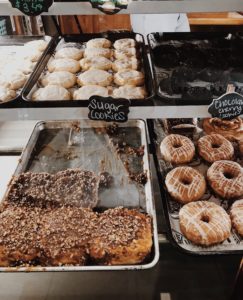by Jenny Rose | Jan 25, 2019 | Connection & Community, Emotional Intelligence, Shadows
I’ve been thinking about shame. It lurks in many of my relationships. I observe it in people around me. I cannot remember a time when I was not deeply ashamed of myself. I’ve written about tribal shaming before, but I’ve never excavated the subject further until now.

Photo by Cristian Newman on Unsplash
Wikipedia has a lengthy page on shame that summarizes different ways in which it has been studied. Assessment tools exist to measure shame and its effects in our lives. Shame has been divided into categories, and distinctions between shame, guilt and embarrassment teased out.
All this information provided me with a lot of interesting context and background, but the subject is not academic for me. I have a problem with shame I want to solve. How do I go about identifying and dealing effectively with the painful feeling of humiliation or distress we call shame?
I learned in emotional intelligence training our feelings are value neutral. Some feelings are painful and others pleasurable, but that doesn’t make them “good” or “bad.” Feelings just are. We all have them, whether or not we allow ourselves to consciously feel them or admit them to others. If we allow ourselves to feel our feelings, they give us information about how we are. Feelings by themselves can empower and enlighten us, guide our choice-making and help us make strong, healthy connections with others.

Photo by John Salvino on Unsplash
Feelings come and go, like the weather, if we allow them to. Refusing to feel a feeling, however, locks it in place, and then we have forged handcuffs and chains for ourselves. The other tricky aspect of feelings is what our thoughts are about them. Thoughts are what lead us into inappropriate action and expression of our feelings.
An emotionally intelligent person recognizes a feeling like rage and takes responsibility for it. In other words, they don’t blame someone or something externally for their rage. That’s a thought. They don’t seek revenge, payback or to re-establish their power over someone they blame as the cause of their rage. They take responsibility for their feeling of rage and discharging it appropriately, knowing none of us think well or make effective choices when we’re in the grip of strong feelings. They also don’t turn the perfectly normal feeling of rage inward against themselves.

Photo by Bewakoof.com Official on Unsplash
After safely discharging rage (hard physical labor, tears, journaling, talking things over, screaming, passionate creative expression, beating up phone books or pillows), the next step is to sit down and have a talk with it. Years ago, when I lived alone, I literally began to sit down and talk with some of my feelings. I’ve written about this previously. I sit in a chair across from an empty chair and imagine myself talking things out with the feeling occupying the other chair. I say something like, “You have my attention. What’s the deal? Why are you so angry?” and then I shut up and listen to my feeling. Feelings have presence. I’ve learned to notice where I experience them in my body, what color they are, their size and shape, their density and texture, their scent and sound. Our feelings are trying to tell us things we need to know, and the more painful, difficult and overwhelming they are the more important their message is.
This is what I have been doing lately with shame. I wait and watch for it, and when it comes I notice and pause. In the middle of a conversation with my partner, I’ll feel shame rise up like a foul smell and I’ll pause and look for what is happening that triggers shame. Something I said? Something I didn’t say? Something he said to me? Something else I’d rather be doing? A subject I don’t want to talk about or don’t care about? What else am I feeling?
After doing this for a couple of weeks, I discover any honest conversation that makes visible my needs and feelings triggers shame. No wonder I feel so burdened if shame is attached to every need and feeling!
Interestingly, during the in-the-moment pauses while I explore all this, more often than not I realize I don’t in fact feel shame at all. It’s become a kind of chronic hitchhiker attached to other feelings.

Photo by Nabeel Syed on Unsplash
A good example is driving. I typically go the speed limit or 5 miles over it, and in bad weather much slower than that. I rarely run late. I hate to rush. I enjoy music and audiobooks in the car and am quite happy driving. I love my commute. The world is full of people, however, who are in a hurry, reckless, and, to my way of thinking, rude. Of course, they think I’m rude for not getting out of their way!
I rarely drive without feeling shame, but I realize now I’m not really ashamed at all of my driving. On the contrary, I think I’m a competent, courteous driver. I’ve also been a lucky driver, because accidents happen to the best drivers out there and I’ve never been involved in more than a fender bender. When someone is crawling up my backside in a snowstorm in the dark on an icy road and I’m blinded by their headlights in my rearview mirrors and have no way to move over and let them by, what I do feel is mad and scared. The shame is about feeling mad and scared, not about my driving choices in that moment. I don’t want some idiot in a big truck to have the power to intimidate me on the road. I resent living in a world where I have to worry about sudden violence and road rage, or being a woman alone at night. I’m furious with people who follow too close, even in good conditions. I hate to be pushed and pressured, and I hate even more to feel I’m in someone else’s way or making someone wait on me. That’s an old trigger for PTSD.
It turns out much of my daily shame is nothing more than a habitual default. A rueful realization, but also good news. Habits can be broken, I’ve had a lot of practice with that.
I’ve never yet successfully broken a habit without replacing a not-so-useful thought or frame with a better one. So, what’s the opposite of shame? If I want to replace shame with something more effective, what would that be?
Shame is akin to contempt. Contempt is the atomic bomb in relationships between two or more people as well as in our relationships with ourselves. Contempt withers love and destroys trust. It’s never constructive. Those who employ it seek power and control over others. Shame and contempt are merciless. Guilt, the recognition of having transgressed against another, can be addressed. We can atone for our actions and words, apologize, take steps to repair the damage we caused. Shame and contempt are without mercy or the possibility of reparation. Guilt says we’ve behaved badly. Shame and contempt say we are bad, we are unworthy, and nothing can ever make us different.
I consulted a thesaurus to look at antonyms for shame and came up with respect. Respect!
Shame: Why are you so stupid and difficult? You’re always in everyone’s way! You don’t belong on the road. Why are you such a goody-two-shoes? No wonder nobody likes you, crawling along like an old lady! Nobody else drives this way. Joe Blow (partner, brother, colleagues, the guy at work who said the roads were fine and scoffed at slow drivers) wouldn’t be driving like this. You do everything wrong. People like you cause accidents because you go too slow.
Respect: Don’t let this idiot drive your car! Go as slowly as you need to. You’ve got good judgement and a lot of experience. These are dangerous conditions and feeling fearful is an appropriate response. I trust you. Don’t let this driver intimidate you. His need to go fast is not more important than your need to stay safe. People driving the way he is cause accidents.
Quite a difference, right?
I suppose there are more elegant ways to grapple with feelings like shame and a trained psychologist or psychiatrist would laugh at me, but I’ve found helping myself is incredibly empowering. My experience of therapy is that having a good guide is invaluable, but even the best guide can’t crawl inside our heads and do the work of staying present and making different choices. That’s all on us. Ditching an ineffective habit is difficult and so is encouraging a new one, but it’s perfectly doable. If I lost my right hand, I would eventually learn to use my left. It would feel clumsy, and no doubt be frustrating, and it would take time, but I would learn to do it. Our brains are surprisingly plastic, and we’re learning more all the time about healing and adapting neurologically and emotionally.
We aren’t born with a feeling of shame. We learn to feel it. Anything we learn can be unlearned. Shame stunts our growth and our joy. Respect is like the wind beneath our wings. I’ve made my choice.

Photo by Yuan Yue on Unsplash
All content on this site ©2019
Jennifer Rose
except where otherwise noted
by Jenny Rose | Nov 22, 2018 | Aging, Connection & Community, Emotional Intelligence
At 6:30 a.m. on Monday morning, we park in the dark, empty parking lot and use a combination keypad to enter the building and a key to unlock the door to the pool, re-locking it behind us. We turn on lights, computers and automatic doors. We run a shower in the men’s and women’s locker rooms, as the hot water takes several minutes to reach them and the early swimmers complain of cold showers. We check the temperatures and chemicals in the pools. We peel off our winter layers and put on suits, shorts, emergency fanny packs and whistles. We check the day’s schedule. All the while, a rising chorus of voices and laughter comes from outside the still-locked door where the early water aerobics class gathers, as though it’s noon and not O-dark-thirty on a cold November morning. The aerobics teacher gets her music ready and checks the wireless headset. This class is large, so she will teach from the pool deck rather than the water.

Photo by ivan Torres on Unsplash
At 7:00 we unlock the door and they stream in, laughing and talking, tousled heads of grey, white and improbable shades of blonde and brown. Not one of them is under 55. This morning the entire class consists of women. They disappear into the locker room, where the mirth and talk continue as they change and shower. I gather up a rescue tube and get comfortable in the lifeguard chair.
Descending the steps into the pool, the women tease one another and complain about the cold water. Many wear glasses, though they’ve removed their hearing aids. Many wear earrings. A couple of them dispense kickboards, foam buoys and floating foam noodles from plastic laundry baskets on shelves at poolside.
On this morning I count 17 in the class. We know one of them had a birthday over the weekend. The instructor gives her a blue plastic tiara and matching wand from the Dollar Store while we all sing “Happy Birthday.” She’s informed the tiara must stay on her head during the class. She presses it firmly onto her grey hair, laughing.
The instructor cues the music. I jiggle the dial on the wireless speaker, which never seems to work properly, and the class begins with the announcement of a Beatles soundtrack. “Hard Day’s Night” starts the warm-up to a 45-minute water aerobics workout.

Photo by Cristian Newman on Unsplash
Music is so evocative. I can’t hear The Beatles without thinking of my brother, who owned and played all their albums when we were growing up. These women are a decade older than I am, and they greet each song with delight. They know every word. They bob up and down, kicking, twisting, using the kickboards and buoys for resistance and strengthening in the water. Most are generous-bodied and their bosoms bounce within the confines of their modestly cut suits. I see lime green, pink and black. I see loosened skin and wrinkled cleavage, pink scalp and cellulite while “Revolution” fills the brightly lit, echoing space.
The instructor guides the class from one set of movements to another. They stand in place. They travel back and forth across the pool. They lift, bend and stretch in a circle. We all sing together. They inform each other, soulfully, “I want to hold your hand.” The water churns with their efforts. “Got to get you into my life!” they shout at one another with hilarious passion.
As I watch, I try to imagine these well-ripened, glorious women as teenagers. I imagine them hearing “Good Day Sunshine” for the first time on radios, records and jukeboxes in diners, in cars and at parties. They were all young once, pretty, idealistic and probably as foolish as most young women are. They had homework and crushes on teachers. They had families and friends and gossiped. The Beatles were part of the soundtrack of their lives. Now, decades later, what old memories, thoughts and feelings do these familiar songs unlock? What stories do they recall, what pleasures, what griefs and disappointments when they hear “All My Loving?”
The very last song is “Yellow Submarine.” By now even I am breathless with laughter. Impossible to hear this music without moving to it, even if confined in a sitting position. The instructor is incapable with mirth. It doesn’t matter. The class guides itself, arms high in the air over their heads, red-faced, panting, dancing in the water. They turn, bump ample hips with one another, gesture flamboyantly, and we all sing at the top of our voices until the music stops and the class ends.
Knowing the routine, the class puts all the equipment away tidily in the sudden quiet. They pull the lane lines back into place and hook them up. They exit the lap pool and move to the 93-degree therapy pool, where they break into groups and chat, some in the shallow end and others floating peacefully in the deep end. The birthday girl is still wearing her blue plastic tiara. Now the talk is more subdued than it was before the class. I hear a discussion about snow shovels, snow blowers, and the performance of various men, hired and otherwise, with these tools. I hear talk of families, grandchildren and plans for the holidays. A group in a corner carries on a low-voiced discussion interspersed with much bawdy laughter. It’s not hard to imagine what they’re talking about. I smile in sympathy. Local news and politics are dealt with, along with the weather, the state of the roads, church gossip, local holiday activities and fund raisers.
It’s just 8:00 on a Monday morning. These women represent part of the backbone of the community. Seasoned, experienced, humorous and wise in the ways of the world, they know exactly who they are and what they’re made of. They’ve loved and lost, worked, raised families, volunteered, suffered grief, illness and injury. They’re outspoken, earthy and unapologetic. They know how to connect with others. They know how to play and laugh. They are kind and compassionate without being sentimental. They know how to love life.
Monday morning we all lived in a yellow submarine for an hour, and proclaimed it joyfully at the top of our voices.
I wish you all abundance this Thanksgiving.

Photo by Joanna Kosinska on Unsplash
All content on this site ©2018
Jennifer Rose
except where otherwise noted
by Jenny Rose | Nov 15, 2018 | Connection & Community, Emotional Intelligence
 We woke to a snowstorm this morning in central Maine. I could hardly wait to get out in it and walk. It was snowing hard and accumulating fast, coming down in heavy, wet flakes. I headed to work midmorning, maneuvering out of the driveway with some difficulty. The ground was already well saturated before this storm.
We woke to a snowstorm this morning in central Maine. I could hardly wait to get out in it and walk. It was snowing hard and accumulating fast, coming down in heavy, wet flakes. I headed to work midmorning, maneuvering out of the driveway with some difficulty. The ground was already well saturated before this storm.
Getting out of the driveway is the hardest part of winter driving here. I’ve been amazed at how well the roads are taken care of in Maine, much better than the rural roads and streets in Colorado. Still, winter driving is winter driving, and I gave myself plenty of time.
I quickly discovered the paved road was every bit as treacherous and without traction as the driveway. There was a heavy coating of slush and no sign of sanding or plowing. If I went over 30 miles an hour I lost traction and I almost couldn’t climb the steepest hill on the way into town. I turned on my audiobook, sipped my travel mug of tea, and settled down for a slow and careful commute, wondering why the road crews seemed to be ignoring the dangerous conditions.
 I started down a gently sloping hill with a shallow curve. One minute I was driving and the next I was floating. I was alone on the road. Nothing happened. I hadn’t accelerated or braked or jerked the wheel. I just started slipping across a thin layer of slush between the tires and the pavement, and I knew I wasn’t going to make the curve. I kept my feet off the pedals and tried to steer into the skid, but the tires might as well have been glass slippers, for all the traction they had.
I started down a gently sloping hill with a shallow curve. One minute I was driving and the next I was floating. I was alone on the road. Nothing happened. I hadn’t accelerated or braked or jerked the wheel. I just started slipping across a thin layer of slush between the tires and the pavement, and I knew I wasn’t going to make the curve. I kept my feet off the pedals and tried to steer into the skid, but the tires might as well have been glass slippers, for all the traction they had.
I was very lucky. The side of the road was thickly edged with woody shrubs like alder and willow. I didn’t hit a pole, tree or fence, and I wasn’t going fast. I also didn’t land in water, a real danger here in Maine. I recognized the weightless feeling in the pit of my stomach and knew I was helpless, a victim of momentum. All I could do was sit tight and wait for the car to stop. I wasn’t at all scared. I had a seatbelt on and I was only coasting.
I’m going to be late for work, I thought, resigned.
The brush and bushes caught me neatly. I turned off the audiobook and engine, turned on the hazard lights, gathered up my keys, wallet and travel mug of tea — not a drop had spilled — and set out for the nearest house.
I was greeted by the baying of several dogs, the alarm calls of a pair of geese and a woman about my own age with very blue eyes. I explained, said I didn’t have a cell phone, and asked if I could call for help.
She was extremely kind. The dogs were contained somewhere while I waited. The geese eyed me balefully. When I stepped inside, the house was warm and a stove glowing. It was a typical farmhouse kitchen, cluttered, friendly, comfortable, filled with plants. She handed me her cell phone, introduced herself as Sarah, and asked if I was hurt. I reassured her I was perfectly unharmed, called my partner and called work. I was about to call AAA when she offered to pull me out with her tractor.
I dithered. I have a horror of being a burden or needing help. Why should this woman leave her cozy kitchen and go out into the snow and slush to pull a stranger out of the ditch? She told me to stop apologizing and pointed out that AAA would likely take a long time to respond, given the local conditions. We both wore heavy mud/snow/rain boots. She flung on an old yellow slicker and fired up the tractor.
The tractor couldn’t get any traction, either. It churned up mounds of mud and grass, but the chain wasn’t long enough to allow it to pull from the pavement, and she came close to sliding sideways into the ditch, just as I had done.
At this point we’d both been lying on the slushy, muddy ground hooking up chains, the snow was coming down in wet clots, and the narrow rural road we were on was extremely hazardous. Sarah took the tractor back and returned with “Tank.” Tank is an old-fashioned heavy farm truck, painted in camo and looking indestructible.
Tank couldn’t pull me out, either.
 During all this, everyone who went by stopped to ask if we needed help.
During all this, everyone who went by stopped to ask if we needed help.
The snow turned to heavy rain.
We went back to the house and I called AAA.
I wanted to wait for the tow truck in the car, but Sarah wouldn’t hear of it. We could see the car from her kitchen window. We were both wet and muddy to the skin. We sat at the kitchen table and talked about our sons (her two and my two) and what we’d done with our lives so far. Every car that went by mine either slowed or stopped. We were so worried someone else would go off the road or my mishap would cause another accident, we put a note on the car window saying Nobody hurt. Waiting for tow truck.
About an hour later a big tow truck pulled up. I thanked Sarah from the bottom of my heart, put my sodden coat back on and went out into the pouring rain. There were two young guys in the truck. They considered the problem, walking around the car in their heavy boots and the bulky waterproof gear all the working men seem to wear here. They decided the only way to get me out was to pull me sideways back onto the road. I was shivering by that time. I got in the driver’s seat, rolled down the window (I could hardly have been wetter), and prepared to follow directions.
While they were working the road was effectively blocked. A big pickup truck came along, pulled into the center of the road behind the tow truck, and turned on his hazards.
They pulled this way and that. I went from neutral to park and back again. I braked when they told me to. The rain ran down my face and neck and under my coat and other clothing. Branches scraped across the car. The winch whined. Mud and slush churned. A few vehicles waited patiently. We finally got two tires on the road. They got behind me and told me to accelerate nice and slow. I did so, they pushed, and the tires found the pavement again.
I thanked them wholeheartedly. I waved to the kind and patient human being who blocked traffic and kept us all safe.
This morning in Maine there have been many, many accidents, including a flipped-over school bus, snowplows off the road, jackknifed trucks and people like me sliding into ditches, power poles and other cars. There have been cancellations, delays and detours. We are warned of flooding. This afternoon and tonight we expect freezing rain. The storm is not over, but my adventures for the day are. I crept back home three hours after I left it, shivering, wet and exhausted, and promptly got stuck in the driveway.
How do we thank the strangers who brush against our lives and lend a helping hand? I’ve never known. A simple thank you seems so wholly inadequate. Still, what else can I say? What about all those anonymous strangers who help in ways we never know about, or come and go so quickly we don’t even see their faces? As an old first responder, I know how essential traffic control is, but I don’t know if the driver who shielded us and stopped traffic was a man or woman. I suspect everyone’s plans were disrupted this morning, but people slowed and stopped to make sure the driver of the car in the ditch was not injured or needing help. Treacherous roads, blinding snow and then rain, a dark November day, and ordinary men and women willing to assist in spite of it, willing to leave their warm firesides and kitchens, willing to climb out of their dry, cozy vehicles, willing to do what they could for a stranger.
These are the darkest times I’ve seen in America in my lifetime, but this morning my faith in humanity was renewed. A series of strangers helped me when I was in need, and because of them I’m back home, safe, dry and warm. I’m grateful. I also know that all over the world people are practicing small acts of kindness all the time, ordinary people going about their business in neighborhoods, communities and at work. This post is for them.
Thank you for checking to make sure a stranded driver is okay. Thank you for answering a stranger’s knock at your door. Thank you for offering a cell phone or other means of communication to someone who is stuck without the ability to call for help. Thank you for helping direct or block traffic so further accidents don’t occur. Thank you for being patient when an accident holds you up. Thank you to all those first responders, tow truck drivers, utility company workers and the other hundreds of thousands who are there with tow chains, chainsaws, shovels and tractors when the unexpected happens. You might be doing your job, but thank you anyway for your smiles, your kindness, your expertise, your willingness to contribute, your difficult and often risky work, and your humanity.
My hope lies in all of us who do what we can in our little corner of the world. The simple, humble kindness of strangers may, in the end, save us.

Photo by David Monje on Unsplash
All content on this site ©2018
Jennifer Rose
except where otherwise noted
by Jenny Rose | Nov 1, 2018 | Connection & Community, Emotional Intelligence
What does it mean to make a home? I wonder if it means something different to everyone, or if we have a common vision.
All my adult life homemaking has been a top priority, not so much for myself, but for others. Creating home has been my labor of love and one of my greatest contributions to relationship. Few things give me as much satisfaction as establishing a place of peace, beauty, security and clean, well-ordered efficiency in which to relax, play, share life and be intimate. In the past I didn’t count the cost in emotional labor, physical labor, time or energy. I didn’t expect reciprocity. I only wanted to be allowed to make the offering of a home.
It never occurred to me the enormous gift of creating a home would be largely invisible and mostly unappreciated.
My disillusionment was gradual. I realized one day cleaning the bathroom meant nothing to those I was sharing it with. It gave me a lot of satisfaction, but was rarely even noticed by others. That was the first time I grasped I wasn’t going to get thanked or validated for cleaning. If I wanted to clean, I needed to make sure I was doing it for myself and have no expectations that anyone else would pay attention.
I was on my own with the cleaning thing.
I was also on my own in evaluating a new home for ease of maintenance and housekeeping as well as suitability for pets and kids. I was the one who thought about clotheslines and their proximity to laundry facilities; flooring in entryways, bathrooms and kitchens; and outside and inside wood storage for the woodstove. I was the one who thought about how to deal with trash and recycling and where to put the litter box and store the dog food.
Not every woman is a natural homemaker. I think many perform as such because nobody else will and the culture expects it of them. I’ve always loved that kind of work, even knowing it’s unpaid and undervalued in the larger world. I assumed, in my innocence, that homemaking was an investment in a healthy and happy family, and that was the only payback I needed.

Photo by Mar Newhall on Unsplash
The thing about being young is we can’t imagine how decades of unappreciated and invisible work and support grind us down and polish a thick shell of cynicism. It turns out I did want some degree of appreciation and acknowledgement from my family for making a home. I couldn’t pull off the perfect wife/mother/housekeeping role with a clean white apron and endlessly abundant nurture, energy, patience, organization and efficiency with no return. I especially couldn’t do it while working outside the home, going to school and single parenting.
Fulfilling cultural expectations turned out not to be very fulfilling, after all.
 Eventually I found myself alone. Children grown and gone, a file folder labeled ‘Divorce’, and freedom to make a home solely for myself at last. Complete and total control. Bliss! I had a wonderful time giving myself exactly the kind of home I’d always dreamed of. All my efforts were on my own behalf. I didn’t care what anyone else thought and I didn’t need anyone to appreciate the home I made for myself. Housekeeping was uncomplicated, easy and filled with joy.
Eventually I found myself alone. Children grown and gone, a file folder labeled ‘Divorce’, and freedom to make a home solely for myself at last. Complete and total control. Bliss! I had a wonderful time giving myself exactly the kind of home I’d always dreamed of. All my efforts were on my own behalf. I didn’t care what anyone else thought and I didn’t need anyone to appreciate the home I made for myself. Housekeeping was uncomplicated, easy and filled with joy.
I concluded homemaking wasn’t, after all, a gift, a talent or an adequate offering. It didn’t translate as a declaration of love, support and commitment. My loved ones didn’t value my contribution. It was a meaningless use of my time and energy and put me in the vulnerable position of looking for validation and appreciation from others.
I felt like a fool, and it made me bitter. I promised myself never again would I try to make a home for anyone but myself.
I never imagined, even as a teenager, anyone would make a home for me. I wasn’t that naïve!

Photo by Vanessa von Wieding on Unsplash
Here in the tarnished and somber season of late fall and lengthening nights an amazing thing has happened.
I noticed it when I began coming home in the dark after work. My partner leaves lights on for me so I can easily negotiate backing into the driveway and navigate the steep cellar stairs. When I open the door at the top of the steps and enter the kitchen, the dishes are done. The house is warm and the wood stove glowing in the living room. The cat is fed. The kitchen smells of beef stew, chicken soup or baking.
Home. My home, but this time not created solely by me for someone else. This home is a collaboration, and it’s incomplete without me. I’m not invisible. My presence has worth. After all these years, all the meals and baking, all the housework and candles and welcoming lights in windows, the clean clothes, the fresh beds, the cared-for animals, the countless cords of wood for various stoves, all that invisible and unnoticed love, I’m reaping a late harvest.
Someone makes a home for me now, and waits for me to return, not to maintain it but to be part of it.
At the end of my workday, I’m actually at the end of my workday. I don’t have to unload the car, fumble my way into a dark house, turn on lights, get the woodstove going, make a meal, take care of pets and/or kids and/or adults, shut curtains and lock doors. My partner doesn’t meet me at the door with roses, wine and sweet talk. He gives me far more enduring and authentic gifts of a place and relationship to come home to. I discover those offerings are every bit as worthy as I imagined when I was a newly-married 21-year-old. All my work over the years was real. It was valuable. It was loving and important. It was a beautiful contribution. The fact that no one noticed or appreciated the home I made for them did not, after all, define the value of my intention.
I suppose it’s just one of life’s little ironies that now, at this late date when I’ve completely given up expectations and fantasies that others will perceive homemaking as an expression of love worthy of acknowledgement, someone in my life finally gives back to me what I’ve given in such abundance to others.
It’s a late harvest, but well worth the wait.

Photo by Craig Whitehead on Unsplash
All content on this site ©2018
Jennifer Rose
except where otherwise noted
by Jenny Rose | Oct 18, 2018 | Connection & Community, Emotional Intelligence, Shadows
 I first heard about toxic mimics as I learned emotional intelligence. The term comes from radical environmentalist author and speaker Derrick Jensen. A toxic mimic is a destructive action, behavior or thing pretending to fill a primary human need. Rape is a toxic mimic for healthy, consensual sex. Sugar is a toxic mimic for food. Addiction is a toxic mimic for managing feelings. A job might be a toxic mimic for contribution. Pseudo self is a toxic mimic for authenticity. Some would argue that social media is a toxic mimic for connection.
I first heard about toxic mimics as I learned emotional intelligence. The term comes from radical environmentalist author and speaker Derrick Jensen. A toxic mimic is a destructive action, behavior or thing pretending to fill a primary human need. Rape is a toxic mimic for healthy, consensual sex. Sugar is a toxic mimic for food. Addiction is a toxic mimic for managing feelings. A job might be a toxic mimic for contribution. Pseudo self is a toxic mimic for authenticity. Some would argue that social media is a toxic mimic for connection.
I believe our modern culture here in the United States, at this moment, rests on an edifice of toxic mimics. People who create, design and sell toxic mimics have a simple agenda: Profit and power. We, the consumers and choice makers, the common people, if you will, happily hand over our power in exchange for the shiny; the new and improved; the seductive promise of success, wealth and love; and the popular. Toxic mimics give us the relief of distraction, instant gratification and the promise of an identity. They help us regulate our mood and feelings.
Toxic mimics have such power over us now that a majority of us (maybe) have voluntarily given management of our country to toxic mimics for human beings.

Photo by Patrick Brinksma on Unsplash
What are the strongest human motivators? Fear? Love? Hate? I could also make a case for denial, but that might be too inextricably bound up with fear to separate. Toxic mimics are deliberately designed and marketed to appeal to the things that drive us at our deepest levels. They are engineered to target our greatest vulnerabilities. They seek to hook us, permanently, helplessly and hopelessly, and they’re so powerful they kill many, many people. Witness the power of nicotine, for example. Toxic mimics promise to fill our lives with everything we want and provide us an identity, but when we employ them we feel emptier than ever. Because we are conditioned to believe buying a product or service will make us feel better, we buy as much as we can as fast as we can, which necessitates a continuous stream of money, a resource that has become one of the most powerful Gods we’ve ever worshipped. Money, one might say, is a toxic mimic for God, or Gods, or whatever word you like to use to communicate the divine.
The deepest irony in this situation is we are the ones who perpetuate the power of toxic mimics. We willfully and intentionally participate. We create demand and gobble up supply. We continue to support advertising, algorithms and the handful of powerful companies who monitor our lives and mine us for information in order to sell us yet more toxic mimics. We applaud and admire what we call “progress”, “growth” and a “healthy economy.”

Photo by Ev on Unsplash
A healthy economy. Healthy for who, I wonder. Healthy for the global system? Healthy for those of us living paycheck to paycheck? Healthy for the children who are victims (yes, I mean victims) of anti-vaxxers? Healthy for people who have no financial resource and thus cannot participate in the latest technology? In a country filled with disbonded children and broken families; rising antibiotic-resistant organisms, including STDs; rising illnesses like typhus which are perfectly preventable with vaccination; astronomical housing costs forcing employed professionals to live out of their cars; broken healthcare and public education systems and a population of obese, metabolically disordered, pharma-dependent, addicted, lonely, suicidal people, we have a so-called healthy economy.
Oh, good. I’m so proud to be an American.
It’s a lie. There’s nothing healthy about what’s happening now, but we’re so stupefied, so numbed, so habituated, that we no longer recognize lies when we hear them. We can’t afford to, because to recognize one means to recognize others, and if the whole thing is based on lies, we’re too afraid to know it. Much easier to cash the insurance check and rebuild, for the third or fourth time, in the same place than take responsibility for facing the effects, long predicted, of climate change.
Of course, insurance companies are not going to continue to subsidize climate change because it destroys their profits, so that might catch our attention — eventually.
 In the meantime, we bend our heads over our handheld, shiny, talking, distracting and instantly gratifying techno-screens or settle down in front of our larger screens and surround sound systems and let the advertising and brainwashing wash over us. We call this life. Isn’t it grand? Isn’t it beautiful? Aren’t you happy?
In the meantime, we bend our heads over our handheld, shiny, talking, distracting and instantly gratifying techno-screens or settle down in front of our larger screens and surround sound systems and let the advertising and brainwashing wash over us. We call this life. Isn’t it grand? Isn’t it beautiful? Aren’t you happy?
A toxic mimic is a promise that never delivers. Sometimes we do it to ourselves. Sometimes we allow others to convince us of the necessity, morality and rightness of our toxic mimics. We’re told they will make us safe. They will make us successful. They will make us healthy and popular, beautiful and beloved. We’re told we have a perfect right to have what we want. We long to believe it. We buy, and then we don’t feel successful or beautiful, so we buy some more. We start giving away our power. We begin to hide our unhappiness. After all, toxic mimics are working for everybody else, aren’t they? Everyone on our favorite social media platform is doing just fine. We conclude there’s something wrong, broken and irredeemably ugly about us. It’s too shameful to admit or talk about. We take even more smiling selfies and post them.
Meanwhile, we elevate and empower not the humanitarians, the natural leaders, the ecologists, the visionary scientists, the emotionally intelligent, the critical thinkers and those who understand complexity and systems, but those who have wealth. Money, that amoral symbol made of paper and metal, is the God we’ve agreed is the most powerful and the most admirable. It’s not so, of course, but we make it so with our belief and our participation. We are driven by our fear of losing economically. We’re evidently prepared to follow the promise of economic power straight to Hell.
Fear is the most powerful hallmark of a toxic mimic. Fear of losing power. Fear of being wrong. Fear of consequences, justice and having to take responsibility. Fear of experiencing our feelings. Fear makes our lives, intellect and hearts smaller, not larger. Toxic mimics don’t meet our needs. They momentarily satisfy, perhaps, our cravings and addictions, our need for stimulation and gratification and our desire for distraction. Ultimately, however, toxic mimics dehumanize us, stop our critical thinking, retard our judgement, destroy our health, disable us from healthy connections and encourage us to hide our authenticity. Toxic mimics feed our rigidity, our ideology, our fear and paranoia, and actively attack our physical and mental health.
Are your needs being met? If you don’t know what your needs are, here’s a needs inventory to look at.
If that question made you cry, or your heart shouted “NO!”, make a list of all your makeup, your clothes, your car(s), your tech, your toys and the other stuff you recognize as part of your identity. Don’t forget your accounts, subscriptions and financial assets.
All that, and your needs are not being met?
Huh. Interesting, isn’t it?
All content on this site ©2018
Jennifer Rose
except where otherwise noted
by Jenny Rose | Aug 9, 2018 | Connection & Community, Emotional Intelligence, Parenting

Photo by Tyler Quiring on Unsplash
We have the great privilege of living close to ravens. These intelligent and entertaining birds make the area off our deck part of their daily rounds, because that’s where we fling the mice caught in mousetraps in the kitchen cupboards, as well as the occasional food rubbish. They’re wary birds. Any flicker of movement in a window sends them aloft, no matter how tempting the morsel on the ground. They make a variety of sounds, but can also be as quiet as a shadow as they wheel over the house, circling and examining the grassy slope below the deck.
This year a pair nested nearby and raised at least one fledgling successfully. Both parents feed the nestlings. A few weeks ago, some instinctive wisdom told the raven parents it was time to stop feeding the fledglings and all hell broke loose in the neighborhood.
The first we knew of it was a plaintive croaking cry, vaguely like a canine yap. We heard it over and over again, clearly coming from something on the wing. It began down over the river and moved up the hill to the house and then I could see the birds. The fledgling was pudgy and puffy, the way all young birds are at the adolescent stage. It looked a little bigger than the adult birds, but not nearly as sleek and not as skilled a flier. The adults flew around it in what looked like a mixture of distress and encouragement, and the youngster complained. And complained. And complained. For hours. Then for days. From first light until sunset it went on.
We watched the parent birds, looking more harried by the day, try to go about their usual rounds up and down the road for roadkill, over our place, over the river and pond, followed everywhere by their noisy, clumsy, demanding offspring, who certainly had the ability and strength to feed himself, if not the desire. At rest, the youngster would gape pathetically, begging each parent in turn for a regurgitated mouthful. Repeatedly, the parents turned away, flew away, dogged and determined.

Photo by Casey Horner on Unsplash
Ravens are great generalists in terms of their diet. I’m sure the fledgling watched his parents eat carrion, fish, frogs, small reptiles and mammals, insects and plant matter. What we were witnessing was not starvation due to lack of available food, or lack of parenting. What played out before us was nothing more or less than adolescent outrage and parenting far superior to anything I ever achieved.
Both my partner and I are parents and worked for years with parents and children. We watched the ravens with a mixture of amusement, empathy and irritation. “Go find your own dead thing,” my partner muttered, imagining the parent birds’ conversation with the importuning fledgling and making me laugh.
When my two sons chose to leave the little mountain town where we lived and finish out their high school years with their dad in the city, I knew it was the right thing for them to do. It was sooner than I had anticipated, true, but we all recognized they had outgrown the school, the town and me. We were no longer living in harmony.
When I found myself alone, I grieved for a long time. I also sold the house and started shaping a life for myself with the good feeling of a difficult job done to the very best of my ability. I’d given all I could and it was time for them to fly and find their own lives. In the space where they had been for fifteen years I could build new freedom and possibility.
Except they were nearly always in my thoughts. We had long phone conversations. I fretted because I couldn’t interact with them face-to-face and I knew many things were happening in their lives they weren’t telling me about. They did tell me of jobs, roommates, broken-down cars, financial difficulties, bars, music, both new and old friends, and romantic entanglements. They called when they were broken-hearted, scared, confused or just pissed off. Frequently, by the time I got off the phone, I was in tears and spent the rest of the day upset, or lay sleepless wondering what I could do. What I should do. What I should have done as a parent that I didn’t do that might have avoided the current crisis.

Photo by Jordan Whitt on Unsplash
I discovered parenting adults is extraordinarily stressful and difficult, with none of the sweet pay-offs I had when we were a family living together. I didn’t see them playing and laughing anymore. I couldn’t touch them or hold them. We couldn’t hang out quietly together. I couldn’t cook for them or watch their faces and bodies mature, marveling at these two people their father and I created.
I’ve recognized in the years between their leaving me and now I wasn’t the excellent parent I thought I was. I was, in fact, merely adequate. I made a lot of mistakes. I was in many ways ill-equipped to parent. Single parenting is an almost impossibly hard road.
I talk to other mothers of adults. Some talk at length about their kids — how proud they are of them, how close they are to them, how successful their kids are. Those parents need no questioning or encouragement. Their conversation is full of their kids all the time, without prompting, and sometimes it’s hard to tell whether the offspring in question is ten or thirty.
Other women, though, acknowledge kids, grandkids and great grandkids, but are not nearly so forthcoming. I’m of that tribe now. Given a sympathetic listener and a relationship of trust, these women tell stories of various addictions, mental illness, toxic relationships, unplanned grandchildren and great-grandchildren, financial struggles, pain, anger, grief and guilt. We find ourselves raising grandchildren and great-grandchildren. We co-sign for loans we can’t afford to pay off. We wonder what we did, or said, or didn’t do or didn’t say that resulted in our kids’ addictions, struggles and unhappiness.

Photo by Josh Applegate on Unsplash
The love that was once the center of our lives and priorities, the strongest, purest feeling we’ve ever had, gradually becomes bewildered and confused. We look everywhere for the children of our memories, but they’re gone. Now, in front of us, are adults. From adults we want responsibility, appropriate boundaries and reciprocity, but our adult children want the unobstructed flow of our nurturing, support and unconditional love to continue, just as it did when they were children.
I didn’t think it would be like this, and neither did my friends.
My thoughts and feelings about my experience as a parent are so tangled I can’t see anything very clearly. Perhaps that’s why I was so taken with the ravens. The animal kingdom has a kind of brutal simplicity with regard to parenting, an instinctive wisdom without concern for what anyone else thinks or cultural and societal norms. The raven parents knew what to do and they did it and endured a few days of discomfort.
Does that mother bird now worry about whether the young adult is happy or not?
Sigh. Probably not.
I notice I never even consider blaming my parents for my happiness or unhappiness. Why, then, do I persist in blaming myself for my adult sons’ choices? Why do I think it’s any of my business at all?
Because I love them.
And so?
And so I want them to be well, and happy, and have good lives.
There are deeper truths, though. I want to be able to think of myself as a great parent. The proof? My adult kids have happy, healthy lives. See how great I was? I also want them to be happy so I don’t have the discomfort of knowing they’re unhappy. How’s that for a piece of maternal selfishness?
So, what, exactly, does a happy, healthy life look like? Is it a life we can boast about in company to illustrate the competence of our parenting? Is it the life “everyone” approves of? Is it the life I approve of? Why do I think I know what a happy, healthy life is for anyone except myself? Most important of all, why did I think I had the power to determine the kind of lives my kids would have?
As parents, we have a lot of power, at least in the beginning. But our power is mixed up with other factors which are not in our control, like genetics, culture, geography and politics. If we judge our parenting effectiveness by the perfect happiness of our adult children, we’re all monumental failures. Life is not one unbroken experience of unadulterated happiness for anyone. Unblemished happiness is, in any case, a lazy, childish goal. What does it mean? Something different to everyone, probably.
What about competence? Yes. I want my kids to be competent. I want them to be able to learn. I want them to have the power to make their own choices and the strength to deal with the consequences. I want them to know how to self-care and love others. I want them to be compassionate, respectful and responsible.
I want those things for them, but I also want them for me so I can feel I parented well and gave them the kind of start every child deserves.
Parenting is an odd business. We enter into years of chaos and hard work and watch our children grow up, never realizing we’re growing up, in many ways, alongside them.
As parents, is it about us, or is about our kids?
I suppose the honest answer is it’s about both, although it feels shameful to admit that out loud.
On the other hand, maybe that’s exactly the way it’s supposed to be. Who knows?
Ravens are solitary. We still have a couple in the neighborhood. I wonder if the youngster has left to find new territory. In time, he may find a mate and raise his own fledglings. He may be killed by a car, a gun, or a predator. He’s on his own in the big world to live his life, however that is, and die his death, however that is. Will the parent birds know? If they know, will they care? Would their knowing or caring assist the young bird in any way, or have they given everything needed already, including forcing the adolescent to begin feeding himself?
I don’t have answers. Nobody I’ve spoken to has answers, but we’re all asking these questions.
I wonder what the ravens would say.
I’m off to find my own healthy and happy afternoon and give my concerns about everyone else a rest.

Photo by Liane Metzler on Unsplash
All content on this site ©2018
Jennifer Rose
except where otherwise noted

























